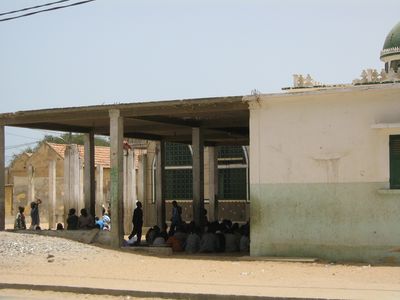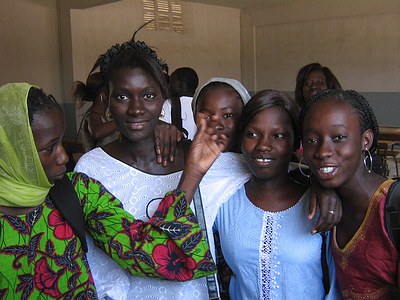| ||
Teaching
At the end of my stay I send Mr Fall a few of my impressions of the teaching. He promised to pass it on to the head of English, via the school headmaster. I’d met the headmaster a few times and formed a fairly low opinion of him; he seemed to be someone who expected respect on the grounds of his position rather than what he did. He didn’t strike me as a man of action, unless that action was shrugging his shoulders, so I doubt my text ever reached its intended destination.

Children attending koranic school. They would study here at the weekends in addition to their regular studies.
I felt the teachers were a little in denial about the level of their pupils’ and the difficulties facing them. This was exemplified at a workshop I was invited to attend for the local English teachers from various schools. I was the only non-teacher and non-local there so it was very kind of them to ask me. It proceeded at a very Senegalese pace: billed as starting at nine, people rolled in from about 9.30 onwards. Best of all was charming and elegant Mrs Fall, no relation to Mr Fall, whose lessons I attended a couple of times. She rather gloriously strolled in about a couple of hours late, signed the attendance register, and left about 10 minutes later. To be fair, with a family to look after, she probably made better use of her Saturday morning than those who attended the full session. The subject under discussion was how to improve their pupils’ reading skills. Some of it was quite interesting, such as examples of how they might be able to guess the meaning of new words from the context. Overall though it was a bit a talking-shop, concentrating on theory from a teacher’s perspective rather than the pupils’ experience. For instance there was an interminable discussion on the technical distinction between “skimming” and “scanning” a text. Perhaps most telling of all though was the argument about whether or not children should be allowed to use French-English dictionaries. I know that this is a favourite topic of language teachers the world over and it provoked a prolonged and heated debate. Afterwards I asked some of the keener pupils whether they had dictionaries of this type. None of them did, nor did they have any access to one, so the debate over how they should use them was utterly redundant. One interesting quote to come out of the session was that “the best teacher is the best actor”. After spending some time in front of the kids I came to agree with this. They responded best to physical explanations of the terms we were trying to teach them, and repetition was key to making things stick. Before embarking on the trip I had expected to enjoy teaching English to small groups of adults, but wasn’t sure I’d be comfortable in front of a class of kids. However I came to really enjoy preparing a lesson then “performing” in front of the class.

Girls from 3eme class
In the class I ran through various reasons why you might be interested in learning English. They didn’t appear very excited about the prospect of hearing Brad Pitt speak in his native tongue, or the extra internet resources available in English, but were moderately responsive to the idea of being able to work in America. However the one suggestion that really made them prick up their ears was being able to understand rap music lyrics. In an attempt to make it sound like I knew what I was talking about I used classroom graffiti to name check a popular rapper, telling them they would need to speak English if they wanted to understand what "50 Cent" was saying. Not being overly familiar with the artist’s work I sought out some sample lyrics, which revealed just how ridiculous an idea this was. All together now class:
Hundred G's I stash it, the mack I blast it
D's come we dump the diesel and battery acid This flow's been mastered, the ice I flash it Chokes me, I'll have your mama picking out your casket, I'm on the next level, bright ring bigot bezzle Benz pedal to the metal, hotter than a tea kettle Tea kettle? Do gangstas drink tea? | ||
|
